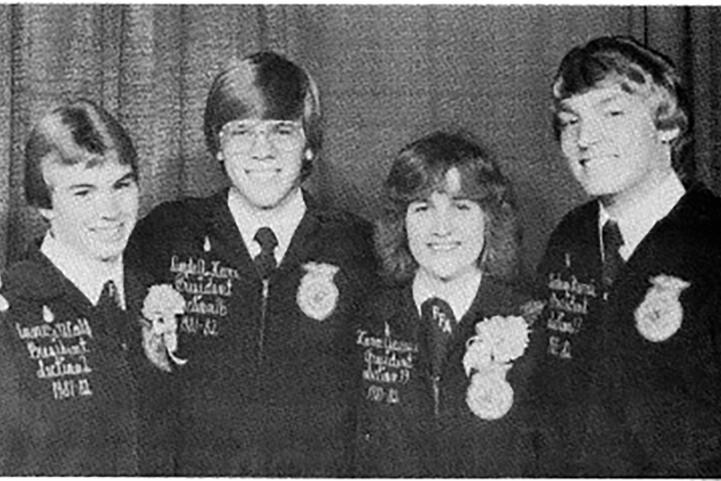From blue jacket to Illini orange — Doyle Karr’s colorful career in agricultural communications

What seems like not long ago, Doyle was a young child growing up on his family’s farm in Wapella, Illinois. The sixteenth of nineteen children, Doyle held responsibilities on their farm just as his siblings did: milking cows, collecting eggs, and working in the garden.
In the blink of an eye, Doyle Karr, a 1986 graduate from the University of Illinois Urbana-Champaign, found himself standing on stage in front of the College of Agricultural, Consumer, and Environmental Sciences’ graduating class of 2024 as a distinguished alumnus and this year’s keynote speaker.
As Doyle addressed in his commencement speech, life passes in the blink of an eye, but it is important to take a step back and reflect on the past.
A path to agricultural communications
In high school, Doyle joined the FFA organization. His time in the blue corduroy jackets was filled with fond memories of traveling with his FFA chapter and finding the best places to eat — in fact, his first memory of eating in a restaurant was through FFA. He also found success in competitions, including the Greenhand essay contest.
Little did he know getting an honorable mention in the national contest would set his future career into motion.
Jim Evans, a professor of agricultural communications at Illinois, took notice of Doyle’s writing ability. With a knock on Doyle’s front door, Dr. Evans opened his eyes to the opportunities that Illinois had to offer.
Upon high school graduation, Doyle joined Dr. Evans at Illinois as an agricultural communications student.
While attending Illinois, Doyle continued to be active in FFA: During his first year on campus, he served as a section president. The following year, he was elected into office as the Illinois FFA State secretary/treasurer when the two positions were combined. He took a year’s sabbatical from college and traveled the state speaking at conferences and workshops, visiting chapters, and representing FFA with businesses and organizations.
“FFA influenced my life a great deal through its hands-on approach,” Doyle said. “Especially that year as a state officer, I got to meet so many different people – amazing FFA members and industry professionals engaged in all aspects of food and agriculture.”
At Illinois, Doyle served as president of Agricultural Communicators of Tomorrow (ACT), a student organization for professional development and networking opportunities that Dr. Evans founded.
“ACT was a great opportunity for leadership and for building a strong community,” Doyle said. “I met people whom I would later work with professionally.”
He fondly remembers the summer trips to the ACT National Convention, connecting with students nationwide. As the ACT advisor, Jim Evans hosted an annual banquet that took the students off campus to Philo, Illinois, to celebrate and reflect on the year’s accomplishments.
Among the other opportunities Doyle had at Illinois to grow his knowledge in agricultural communications, he was editor of Illini AgriNews, a student-made newspaper similar to what now is The Morrow. Each semester, the newspaper would release a new edition filled with stories about students and faculty within the College of ACES.
When Doyle was on campus, computers and printers were not accessible to everyone. The stories were submitted on paper. “We spent one weekend downstairs in Mumford, borrowing the computers from the cooperative extension. We would have just a weekend to input and edit stories and then take the files to the business that printed the newspaper,” Doyle said.
Making a difference in the agricultural industry
In May of 1986, Doyle graduated from Illinois and dove into a fruitful career. He worked as a field editor for Wallaces Farmer magazine in Iowa and Prairie Farmer in Illinois before joining Pioneer Hi-Bred in 1989. Doyle held several communications roles for Pioneer before becoming director of global communications in 2004 — a job he held for 10 years while also serving as the public affairs lead across DuPont’s agriculture and nutrition businesses. He was director of biotech public policy for DuPont until its merger with Dow. He then served as director of consumer insights and food systems engagement at Corteva Agriscience, the agriculture spinout from the merger.
Doyle addressed many challenging topics in his communications career, including genetically modified organisms (GMO). “A big part of my job was to meet people where they lived,” Doyle said. “How do we change our way of communicating so we can help everyone understand?”
Doyle transformed the customer-to-company relationship when it came to difficult issues. “It all comes down to trust,” he said. He adopted an idea called the social license, which requires businesses to prioritize the public’s perceptions before using a new technology.
Trust and transparency changed the industry norms for adopting new technologies or practices, like gene editing. “Gene editing is embraced better than GMOs in part because we were applying those principles,” Doyle said.
Just two years ago, Doyle retired from Corteva and took a step away from his traditional career. He began his own independent consulting firm, working with nonprofits, universities, and start-ups.
“I love the career I had, but at this stage in my life, independent consulting has been a lot of fun,” Doyle said. “It allows me to work with people who I admire and where I can uniquely add value.”
In the blink of an eye, life continues to speed by.
“It was a surreal experience being the commencement speaker,” said Doyle. “I had thought that graduation was special for the graduates and a box-checked for all the faculty. Oh, how I was mistaken.”
The experience made Doyle reflect on his childhood experiences on the farm and his 32 years of working in the agricultural industry alongside farmers.
“Graduation was like harvest time,” Doyle said. “Whether it was a successful or tough year, I could see the joy and pride glowing from the faculty members as they celebrated the 2024 graduates.”